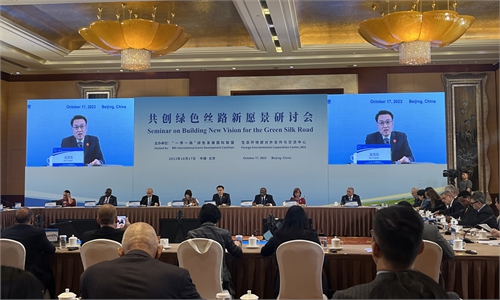
Illustration: Tang Tengfei/Global Times
With continuous technological progress and the acceleration of global digital development, digitalization has become an important force to promote economic growth and social progress. But for various reasons, some developing countries still have not caught up with this trend of development.Against this backdrop, digital development is also expected to become a major direction of Belt and Road Initiative (BRI) cooperation, as the digital transformation in China's western region is likely to offer more opportunities and scope in this area.
For example, all towns in Southwest China's Xizang Autonomous Region have been connected to 5G networks, the Xinhua News Agency reported on Monday. Xizang has 8,710 base stations and 1.84 million 5G network users.
Compared with the eastern part of China, the western region mostly lags behind in terms of digital development. But in recent years, local governments and companies have stepped up efforts to promote the region's digital transformation. 5G access in Xizang, which is expected to bring more economic vitality and development opportunities in areas like agriculture, tourism, education and the medical system, is a typical example of the digitalized trend in the western region.
More importantly, at a time when the third Belt and Road Forum for International Cooperation is being held in Beijing on Tuesday and Wednesday, as the BRI reaches its 10th anniversary, 5G access in Xizang is a reminder that the digital development in China's western region will also be conducive to digital cooperation among BRI partner countries and regions.
The past decade saw BRI cooperation bring many opportunities for the development of China's western region. For instance, the level of openness to the outside world has greatly improved in China's central and western regions. Customs statistics show that in the first five months of this year, the central and western regions' total trade with BRI partner countries surged more than 30 percent year-on-year.
Likewise, China's investment and support in the western region's information technology and digital economy will provide more favorable conditions for cooperation in the digital industry, facilitating cross-border cooperation and development of the digital economy.
Many developing countries that were already behind in the Third Industrial Revolution are facing increasing challenges in catching up with the fourth one, which has already begun with faster-than-ever technological progress in terms of big data, cloud computing, artificial intelligence and the Internet of Things. If the developing world cannot quickly adapt to the new trend of digitalization in the new era, it will be at an even greater disadvantage in its future development in the face of Western technological and economic advantages.
For developing countries, whether they can achieve high-quality development in the digital economy is of great significance to their economies and societies. The digital economy is an important engine of economic growth in terms of improving production efficiency and reducing costs. As companies can provide better products and services with digitalized development, a country's international competitiveness will also be improved. Moreover, the development of the digital economy can promote social development in all aspects, such as education, healthcare, livelihoods and renewable energy.
Over the years, China has made remarkable achievements in digital infrastructure and various digital applications. Adhering to the belief of common development, China is willing to help developing countries catch up with the Fourth Industrial Revolution and achieve common prosperity and sustainable development under the BRI framework. The future construction of BRI cooperation needs to take the opportunity of the digitalization trend.



